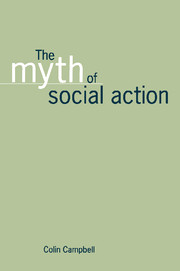
The Myth of Social Action
- Author: Colin Campbell, University of York
- Date Published: July 1998
- availability: Available
- format: Paperback
- isbn: 9780521646369
Paperback
Other available formats:
eBook
Looking for an inspection copy?
This title is not currently available for inspection. However, if you are interested in the title for your course we can consider offering an inspection copy. To register your interest please contact [email protected] providing details of the course you are teaching.
-
The Myth of Social Action, first published in 1996, is a powerful critique of the sociology of the time and a call to reject the prevailing orthodoxy. Arguing that sociological theory had lost its way, Colin Campbell mounts a case for a new 'dynamic interpretivism' a perspective on human conduct which is more inkeeping with the spirit of traditional Weberian action theory. Discussing and dismissing one by one the main arguments of those who reject individualistic action theory, he demonstrates that this has been wrongly rejected in favour of the interactional, social situationalist approach now dominating sociological thought.
Read more- Tightly argued and clearly written critique of prevailing orthodoxy
- Makes case for radical reinterpretation of Weber which sheds new light on sociological theory
- Hardback well reviewed in journals for its contribution to contemporary sociology
Reviews & endorsements
'… a beautifully sustained, clearly written, and multifaceted critique … Campbell has issued a challenging text and, indeed, an open call for immanent disciplinary reformation. Such a text would be of considerable interest, I should think, to sociologists of any stripe, but especially to those who fancy themselves as reflexive and historically minded social theorists.' Steven P. Dandaneau, Sociological Inquiry
See more reviews'… a tightly argued volume marked by that rare level of analytical rigor and thoroughness to which Campbell has already accustomed us … We may view The Myth of Social Action as a contribution not only to the re-assertion of a Weberian perspective on action, but also to the grand, but seldom followed, tradition of general sociological theorizing'. Ilan Friedrich Silber, Contemporary Sociology
'Campbell's argument that contemporary sociology is hobbled by 'situationalism' represents an extraordinarily original rethinking of the field as it has vome to be commonly accepted and understood. His theoretical broom sweeps the way clear for a new, fundamentally cultural understanding of even the most highly rationalized and individualized societies. The Myth of Social Action is a must read.' Jeffrey C. Alexander, University of California, Los Angeles
Customer reviews
Not yet reviewed
Be the first to review
Review was not posted due to profanity
×Product details
- Date Published: July 1998
- format: Paperback
- isbn: 9780521646369
- length: 208 pages
- dimensions: 229 x 152 x 12 mm
- weight: 0.31kg
- availability: Available
Table of Contents
1. Introduction
2. Action reported missing in action theory
3. Action and social action
4. Action versus social action
5. The rise of social situationalism
6. The argument by denial
7. Accounts and actions
8. The argument by exclusion
9. The argument by incorporation
10. The 'learning everything from others' thesis
11. The communicative act paradigm
12. The linguistic turn for the worse
13. The myth of social action
14. The obstacle which is social situationalism
15. Bringing action back in.
Sorry, this resource is locked
Please register or sign in to request access. If you are having problems accessing these resources please email [email protected]
Register Sign in» Proceed
You are now leaving the Cambridge University Press website. Your eBook purchase and download will be completed by our partner www.ebooks.com. Please see the permission section of the www.ebooks.com catalogue page for details of the print & copy limits on our eBooks.
Continue ×Are you sure you want to delete your account?
This cannot be undone.
Thank you for your feedback which will help us improve our service.
If you requested a response, we will make sure to get back to you shortly.
×


